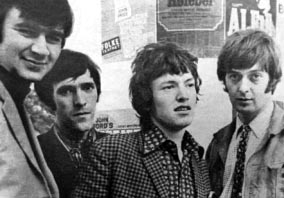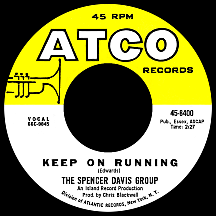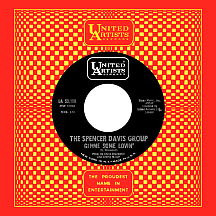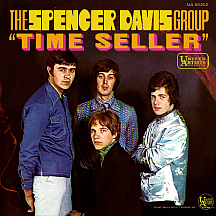THE SPENCER DAVIS GROUP
The Merseybeat bombardment of 1963 (Scouse bands The Beatles, Gerry and the Pacemakers and The Searchers all had chart-topping U.K. hits that year) triggered a nationwide search for enterprising combos with similar potential. A band from Birmingham, centrally positioned about halfway between Liverpool and London, was discovered by Chris Blackwell, a London-born entrepreneur who'd started Island Records in Jamaica in the late '50s; by '63 he was back in his hometown, on the lookout for a means by which to compete and expand his business. Early the following year he found an act that met his expectations, performing at London's Marquee Club under a somewhat generic but wholly descriptive name, The Rhythm and Blues Quartet. Once signed, they got busy recording as The Spencer Davis Group, using the act's founder and leader's name. But Davis didn't become the band's big star...his lead singer did.
Melvin Winwood (nicknamed "Muff" after Muffin the Mule, a children's TV show character he liked) and younger brother Stephen Winwood (they called him "Stevie") were raised in a blue collar Birmingham family with a saxophone and clarinet-playing dad who motivated their own musical interests; Muff played guitar and bass while Stevie preferred piano. By 1962, the 19-year-old elder sibling started The Muff Woody Jazz Band; soon, his five-years-younger brother joined to sing while his fingers sashayed across the keyboard.
Welshman Spencer Davies spent his infancy with an ongoing fear of the bombs Germany regularly dropped on Southern Wales (they called it "the Blitz") during World War II. After finishing school, he moved to London and played with skiffle groups but had a deeper desire to perform the blues. After spotting Muff's band in a Birmingham club, he was knocked out by the younger Winwood's vocal skills, soon forming the Rhythm and Blues Quartet with the brothers and drummer Pete York. Spencer sang lead on blues songs while big-voiced "little" Stevie did the bulk of the singing. The record label deal came after more than a year spent in Birmingham nightclubs and, later, in London.
Davies (whose name was pronounced the same as Davis) was often billed using the original spelling in ads and on posters for their gigs; to avoid confusion, he changed it when the group got signed. Blackwell released his masters to the Fontana label and the first single, a remake of blues great John Lee Hooker's 1956 Vee-Jay recording "Dimples," appeared in the spring of 1964. Reviews were mostly positive; the group's tight musicianship and Stevie's vocal sound (favorably compared to Ray Charles) made for an encouraging start. American R&B was the band's main influence; the second release was a cover of songwriter Smokey McAllister's "I Can't Stand It," an early '64 hit for The Soul Sisters. Spencer's bass playing highlighted Stevie's singing at key moments in the song, a technique that would be used to even greater advantage on later tracks; the single reached Britain's top 50 in November and was issued on the U.S. Fontana label a few weeks later. Two more cover versions made the U.K. top 50 in the first half of '65: a cover Brenda Holloway's Motown hit "Every Little Bit Hurts" (penned by Ed Cobb) and "Strong Love," originally done by The Malibus for Don Robey's Houston-based Sure-Shot label.
Winwood had passed his 17th birthday by the time of his, and the band's, major-league breakthrough. "Keep on Running" by Blackwell discovery Jackie Edwards, a Jamaican singer-songwriter with several hits in his homeland, had been recorded ska-style for Island Records and released in Jamaica on the WIRL label. All the elements came together in a soulful, rocking cover by the Davis Group that reached the number one spot in the U.K. in January 1966, leading to its appearance on Atco, making a modest appearance on Stateside charts in March. "Somebody Help Me," another Edwards tune, sent the SDG to Britain's top spot in April, putting them in a league with the Beatles and Stones. Next step: starring in a movie! The Ghost Goes Gear, a musical comedy with a "haunted manor" setting, is worth watching for some excellent performances including the group's autumn '66 hit "When I Come Home" and a chance to see and hear Davis himself doing the vocal on "The Midnight Special."
The career show-stopper came with some controversy. "Gimme Some Loving" proceeds with Muff's now-classic bass hook, hard-hitting rhythm (Pete's percussion augmented by producer Jimmy Miller pounding on a large African drum), plus a killer Hammond organ riff and feverish vocals by the not-quite-legal-adult Winwood. A United Artists release in both countries (in the U.S., the title was changed slightly to "Gimme Some Lovin'"), it landed at the U.K.'s number two spot in November '66 (behind "Good Vibrations" by The Beach Boys) and became their first top ten smash in the States several weeks later. One little problem: many feel the song, with songwriting credit to Winwood, bears more than a passing resemblance to "A Lot of Love," a Minit Records single from earlier in the year by U.S. soul singer Homer Banks (in all fairness, the bass riff is note-for note, but that's about it). Was it plagiarism? Some critics fiercely supported the theory. Chris Blackwell's subtle response was to hang a broken copy of Banks' single on the wall of his office. Neither Banks nor co-writer Deanie Parker made a claim for credit or a share of royalties.
Here's one way to follow a massive hit and instant classic: by rocking out again with a similar sound, great bass and organ and wild vocals. "I'm a Man" (no resemblance to the like-titled, eleven-year-old Bo Diddley benchmark updated by The Yardbirds some 15 months earlier), a Winwood-Miller song in the same torrid zone as the previous effort, went top ten in England and America. Then "Somebody Help Me" was revived for U.S. consumption and had a respectable summer run. It appeared Davis's band would be revered among Brit rock royalty by decade's end. Ah, but for one minor wrinkle: lead singer Stevie abuptly quit and put together a group with his pals Chris Wood (on sax and flute), Dave Mason (guitar) and Jim Capaldi (drums). United Artists had the contract on this act as well, crediting the first single, "Paper Sun" (a big step into psychedelia), to Traffic featuring Stevie Winwood, not hiding the fact that the lead singer was the same one who'd been with the Davis Group, like, a week earlier...?

Muff Winwood left at about the same time for his own reasons. Pete York stuck around another year or so. Spencer Davis basically had to start over on a moment's notice...just after the group's greatest success. He reacted by assembling a new lineup that included guitarist and vocalist Phil Sawyer and keyboardist Eddie Hardin. This new outfit recorded an original song, "Time Seller" (penned by all but York), which peaked late summer at about the same time as Traffic's record. Immediately, both bands contributed songs to the soundtrack of the youthful, swinging sex comedy Here We Go Round the Mulberry Bush, Traffic supplying the theme and two other songs, Spencer's new group taking the rest, which included "Looking Back" (a minor chart entry in the U.S.); such close adjacency much have thrilled the still-wincing Davis.
The Spencer Davis Group had one other U.K. hit, "Mr. Second Class," while Traffic scored high with "Hole in My Shoe" and the "Mulberry Bush" theme, before Winwood did to Traffic what he'd done to Davis, York and his own Muffin' brother. The hugely popular blues-rock trio Cream (Jack Bruce, Eric Clapton and Ginger Baker) broke up in the fall of 1968; Winwood left Traffic in December and without missing a beat teamed with Clapton, Baker and Ric Grech (of the band Family) to make an album as Blind Faith. They spent the summer of 1969 touring and promoting the album (with its infamous cover photo of a topless eleven-year-old girl, replaced shortly afterwards by a non-problematic pic of the informal foursome), which simultaneously hit number one in England and America in mid-September. With that out of the way, they split up the following month. Drummer Baker formed Ginger Baker's Air Force near the end of the year, which led to two albums in 1970. Winwood was with the band long enough to sing lead on two songs before moving on...again. So much impulsive zig-zagging...it's what rock and roll is all about, right?
Blackwood had offered Muff Winwood an A&R position with Island Records and he remained there for a decade, then spent many years in a similar position with Britain's CBS Records. Davis kept the band going through 1969, adding drummer Nigel Olsson and bassist Dee Murray (both eventually became regulars in Elton John's band). He had one more stint leading The Spencer Davis Group in 1973, which featured Sawyer, Hardin, York and Ray Fenwick of the post-'67 incarnation. Later, he too worked in Island's A&R department.
Davis's lead singer shortened his name by one letter to Steve Winwood, returned to Traffic and remained until 1974, then embarked on a solo career that scaled the heights of superstardom, enjoying a long string of hits including the number ones "Higher Love" (the 1986 Grammy winner for Record of the Year) and 1988's "Roll With It." After the 21st century got under way, Spencer Davis once again indulged his greatest passion, fronting various touring lineups under the eponymic name of his notorious and truly classic rock group.
NOTABLE SINGLES:
- Dimples - 1964
- I Can't Stand It - 1964
- Every Little Bit Hurts - 1965
- Strong Love - 1965
- Keep on Running - 1966
- Somebody Help Me /
Stevie's Blues - 1966 - When I Come Home - 1966
- Gimme Some Lovin' - 1967
- I'm a Man - 1967
- Time Seller - 1967
- Mr. Second Class - 1967
- After Tea - 1968
- Looking Back - 1968
- Short Change - 1969
- Catch You on the Rebop - 1973
- Mr. Operator - 1973
- Livin' in a Back Street - 1973
- Don't Let it Bring You Down - 1973




